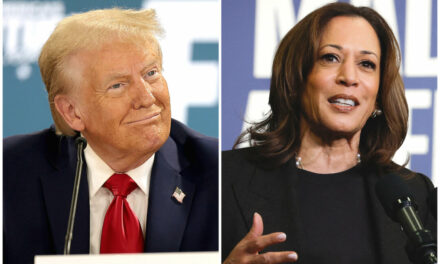We support our Publishers and Content Creators. You can view this story on their website by CLICKING HERE.
The possibility of a special vote in Congress to budget for more disaster relief has been up in the air since Hurricane Helene made landfall in late September.
Former President Donald Trump told members of the press during a visit to Asheville, North Carolina, that he was in favor of Congress returning from their recess early to pass additional relief for the victims of Hurricane Helene.
“Now they’re saying, ‘Can we have a special vote? Let’s have a special session,’” he said of members of Congress on Oct. 21. “I’m in favor of that. But somebody has to get back to why did they spend hundreds of millions of dollars on something that they were not supposed to be spending.”
The possibility of Congress being called upon to supplement FEMA’s disaster relief has been up in the air since Hurricane Helene made landfall in late September.
When asked if he would call Congress back for a special session to allow that supplemental, President Joe Biden said on Sept. 30 that he may have to make that request but that no decisions had been made yet. Thus far, he has not called for that session, but he has called on Congress to ensure that funding is available for responding to these disasters.
Hurricane Milton hit Florida less than two weeks after Hurricane Helene, further stretching the perceived limits of FEMA’s funding.
“I have the full authorization to spend against the president’s fiscal year ‘25 budget,” she said. “And we will continue to meet the needs of the individuals that are impacted by these storms.
“But we don’t have enough money to continue throughout the rest of the year. And we went into immediate needs funding earlier in the year to make sure we can do just what we’ve been doing through Helene, as well as now the preparations for Milton.”
U.S. Department of Homeland Security Secretary Alejandro Mayorkas said in a White House briefing on Oct. 10 that FEMA did have enough money to assist with the “immediate” needs of individuals impacted by the two hurricanes and associated tornadoes.
Calls for that special session also have come from both sides of the aisle, including Reps. Jared Moskowitz (D-Fla.) and Anna Paulina Luna (R-Fla.) proposing a bipartisan, $10 billion funding boost.
On Oct. 21, Speaker of the House Mike Johnson’s (R-La.) office issued this comment:
“The Biden-Harris Administration has the necessary disaster funding right now to address the immediate needs of American people in these hurricane-affected areas. Congress is tracking this situation closely, and when Members return in just a few short weeks, the Administration should have an accurate assessment of the actual dollar amount needed and there will be strong bipartisan support to provide the necessary funding.”
Congress is in recess until Nov. 12.
Meanwhile, Trump praised the emergency response work of private citizens in the aftermath of Hurricane Helene whom he heard about and saw during his visit to Asheville.
“In the wake of this horrible storm, many Americans felt helpless, and abandoned, and left behind by their government,” Trump said on Oct. 21. ”And yet, in North Carolina’s hour of desperation, the American people answered the call, much more so than your federal government.”
Chase Smith and Jack Phillips contributed to this report.

 Conservative
Conservative  Search
Search Trending
Trending Current News
Current News 







